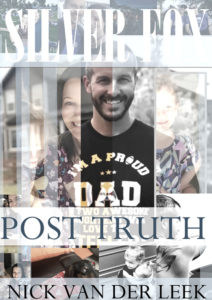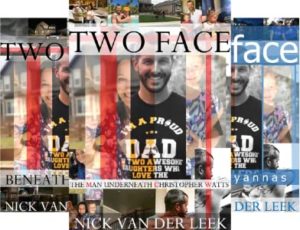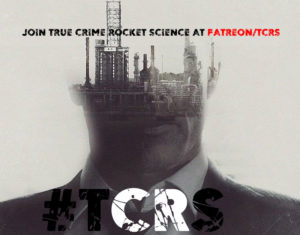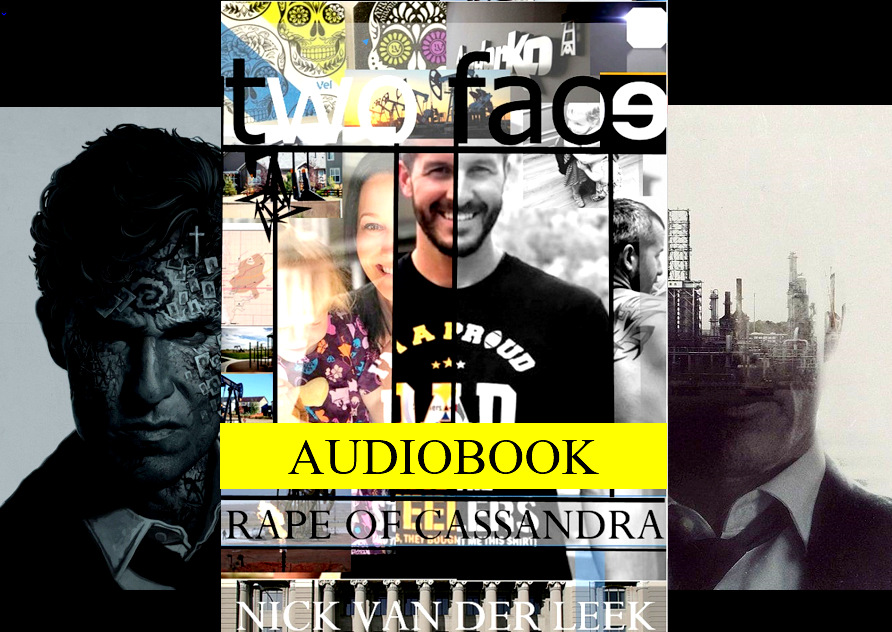She’s a Facebook maven, he’s an introvert. That’s the Chris Watts case, and the relationship dynamic in a nutshell. It’s very simple, but as we begin to educate ourselves on this case, we see a myriad of complicated psychologies spewing out of the opened can of worms.
At Rocket Science we’re allergic to labels, but I’ve recently started thinking about the psychopath label in a new way, which is often the opposite of what labels intend because labels put our thinking in a box, close it, package it and we’re done.

Chris Watts – a teenage psychopath?
I was thinking of Watts – just an aspect of his identity – as a teenage psychopath. Teenagers are trying to be something, aren’t they? Teenagers often are faking it to make it. But you only get to be who you are in the theater of the real world, and many of those early existential stabs end in failure. Nevertheless, it’s important to try, to fail, to fall, in order to live and develop as individuals, to eventually find our ways from raw idealism to real and true identities and our superhero costumes [fashioned by ourselves, for ourselves].
School shooters are invariably teenage psychopaths, but it’s also a mistake to think they exist in a vacuum. If they managed to not blow up and graduated high school, probably they would go on to lead normal, perhaps even productive lives. It’s the equivalent argument to: “Why didn’t he just get a divorce” [“why couldn’t you just graduate?”]
Of course we wouldn’t be here talking about true crime if every criminal simply “managed not to blow up”. The point is they did, many have and many will. Why do people blow up, and what does that say about us?
More: The reluctant killer
Columbine seniors graduate under the shadow of shooting [the shooting took place on April 22, 1999, barely a month before the shooters were due to graduate on May 22nd, 199].
Watts versus the Mass Shooter Mindset
I’ve studied mass shooters in detail, but that’s not what I want to get into here. Rather, it’s this idea of agency and how it relates to true crime. Agency is of course precisely what the mass shooter in the school setting is trying to achieve, and though their methods suck, they act as spocial failures but their actions do succeed in making them celebrities of a sort.
Crazed girls flood Parkland school shooter Nikolas Cruz with fan mail – SunSentinel
Christopher Watts receives love letters while serving life sentence for murdering pregnant wife, two daughters – Denver Post
This attraction to notorious killers by teenage girls and young women is their attempt to gain agency by piggybacking onto the newly achieved agency the criminal achieves by becoming famous because of his criminal act. Does that make sense?
But let’s try to get to grips with how this idea of agency actually plays into the why of a crime. It’s especially relevant in the Watts case, so it’s worth a deeper look into.
At 18:10 in the clip below Cameron Kasky talks about how the March for our Lives changed America. [Watch the rest of the video if you want to understand the broader context of the conversation]. I’ve highlighted just the snippet the comes up about agency below.
https://youtu.be/EYLm6baQ89A?t=1090
KASKY: I think the thing that the March for our Lives did to this country was we told a whole generation of kids, we need to start working together, we need to start thinking, and just because we are little does not mean we are inadequate when it comes to being part of a conversation.
SACKUR: I find that so interesting because, clearly, in the reaction to what you did, there were some people…who spoke of you as young people who couldn’t possibly be agents for yourselves, for change. You must have been controlled by either your parents or by liberal advocacy groups, and I guess what you showed is that particularly in the age of social media, young people do have agency. They actually have a means to get a message out there for themselves and of themselves. You’re a real, interesting example of what now young people can do and achieve.
If we apply this concept of agency to the Watts case [I’ll explain what is means in a moment] we have a similar scenario of a teenager at home leading a double life doing shit, while at the same time being under the thumb of parents, or in Watts’ case, his wife. That’s how he felt anyway.
In the same way that teenagers do or do not engage with their parents or society because they feel inadequate, insecure, intimidated or just small, there’s a similar introversion with Watts. He just can’t stand up for himself. He wants to, but he can’t. He’s afraid for some reason.

Live in a box, or explode out of it?
Teenagers can be kept in a box, and introverted teenagers even more so, but invariably something happens, some drama or trauma, which causes them sooner or later to explode out of it. This is necessary, and part of the leaving-the-nest process. It’s necessary but nevertheless painful. When this happens, the teenager begins the process of developing his own agency.
Having agency is like having a sense of identity but it goes further than that. It is having the capacity to assert oneself in one’s environment, and in particular, towards society. It’s how we establish where we fit in the social fabric. Those with powerful agency become leaders or influencers, those with little or no agency play second fiddle [sometimes for their entire lives].
So what is this agency thing anyway?
Here’s the Wikipedia version:
Agency is the capacity…to act in a given environment… In sociology, an agent is an individual engaging with the social structure. Notably, though, the primacy of social structure vs. individual capacity with regard to persons’ actions is debated within sociology. This debate concerns, at least partly, the level of reflexivity an agent may possess.
In trying to understand agency we stumble across another concept: reflexivity. We won’t interrogate that here, but it also has a bearing on the Watts case:
A reflexive relationship is bidirectional with both the cause and the effect affecting one another in a relationship in which neither can be assigned as causes or effects.
When we impute the idea of reflexivity in the Watts case, what we’re asking it to what extent Shan’ann’s death was as a result of the underlying dynamics of their relationship. Was it directly related, was it somewhat proportionate, or was Watts simply a monster and these issues are simply meaningless chaff?
Back to our definition of agency:
Agency may either be classified as unconscious, involuntary behavior, or purposeful, goal directed activity (intentional action). An agent typically has some sort of immediate awareness of their physical activity and the goals that the activity is aimed at realizing. In ‘goal directed action’ an agent implements a kind of direct control or guidance over their own behavior.
Premeditated or Involuntary – or both?
In the context of true crime, and the Watts case in particular, we need to be sure to what extent Watts’ agency was unconscious or even to some extent involuntary, or whether it was intentional. This is a tricky one because the premeditated murder aspect makes what he did seem very purposeful. In the high profile cases I’ve studied, Watts went to more trouble than most to dispose of his victims. Arguably, Scott Peterson went to even more trouble by buying a boat and hiding the boat in order to pull off his criminal scheme against Laci.
Watts reflexivity and agency in terms of the pregnancy is another area worth exploring. It makes sense that Watts was very reflexive in terms of the third pregnancy. The cause and effect of the pregnancy on most people is huge, whether positive or negative. The whole delay of the gender reveal was in effect about hiding Watts’ teetering agency – in terms of his fatherhood. So we have this strange contradiction, where the denial of the child illustrates a lack of agency, whereas the affair does the opposite [though not in a particularly flattering way]. The murder becomes a final effort to legitimize his agency, that’s how he rationalizes it, but one cannot have a legitimate claim to anything by cheating [in other words, through illegitimate means]. And during the interrogation with the Feds, Watts seems to realize this [not in these terms, but in how he feels], and throws in the towel.
And subsequent to that he’s thrown in the towel – it seems – on his life. He’s admitted he has no agency, so much so he hasn’t even appointed “an agent” [a lawyer] to represent him. His agency is so poor, the idea of representing himself simply isn’t there!
Chris Watts’ Agency – high, low or changing?
What cannot be disputed is that Watts’ agency – as a man – was low. His capacity to represent himself was low. He lacked capacity in terms of his wife, later even towards his own children and unborn child, to the media, and he folded spectacularly when faced with proper interrogation techniques [as discussed in DRILLING THROUGH DISCOVERY] imposed on him by the FBI and CBI.
His failure to pass the polygraph also shows something else. It’s not so much that he took the test and failed, but that he took the test in the first place. This suggests Watts was in a period of transition, where he was developing agency, or trying to. Taking the polygraph was part of that. Talking to the media was part of that. Talking to the FBI without a lawyer was part of that. His affair was part of him trying to develop his game in the real world.
What the FBI and this whole, horrible crime exposed was that in his clumsy efforts to achieve agency in his life, Watts lost what little he had gained [with Kessinger, with his new look and potential job prospects etc]. The act of murder was both the confirmation of Watts’ agency and the destruction of it.
The inevitable conclusion to this line of thinking is what impact did Shan’ann have on Watts’ agency, and strictly within those narrow terms, whose fault was it if his capacity to act was undermined and/or destroyed?












Recent Comments